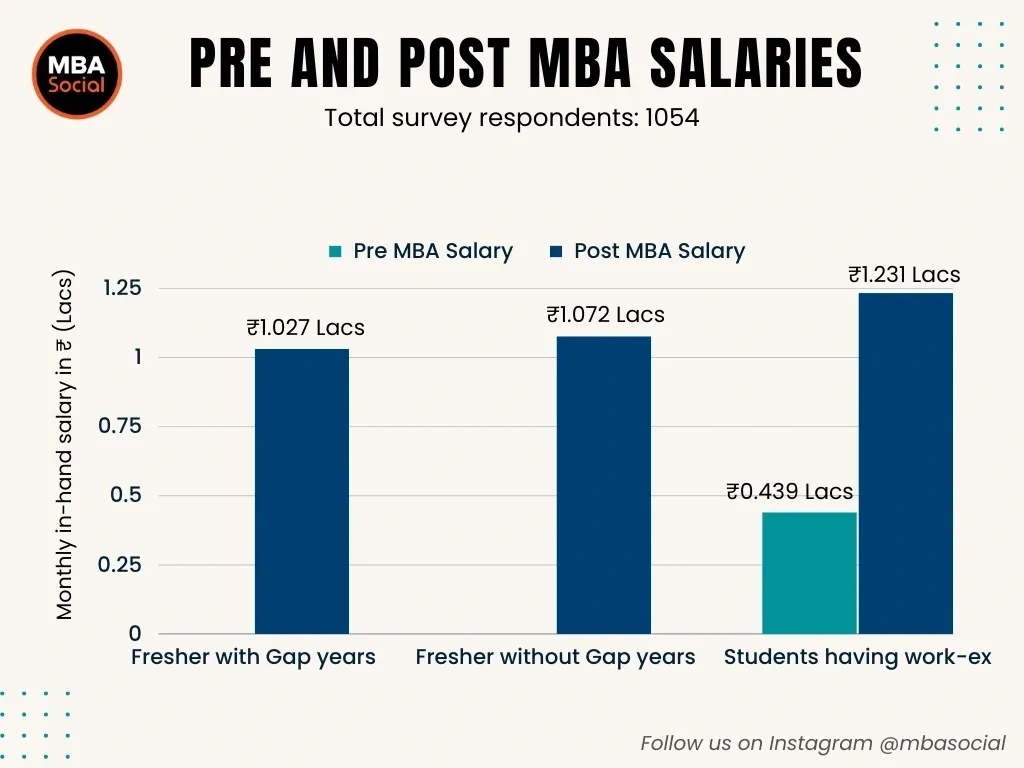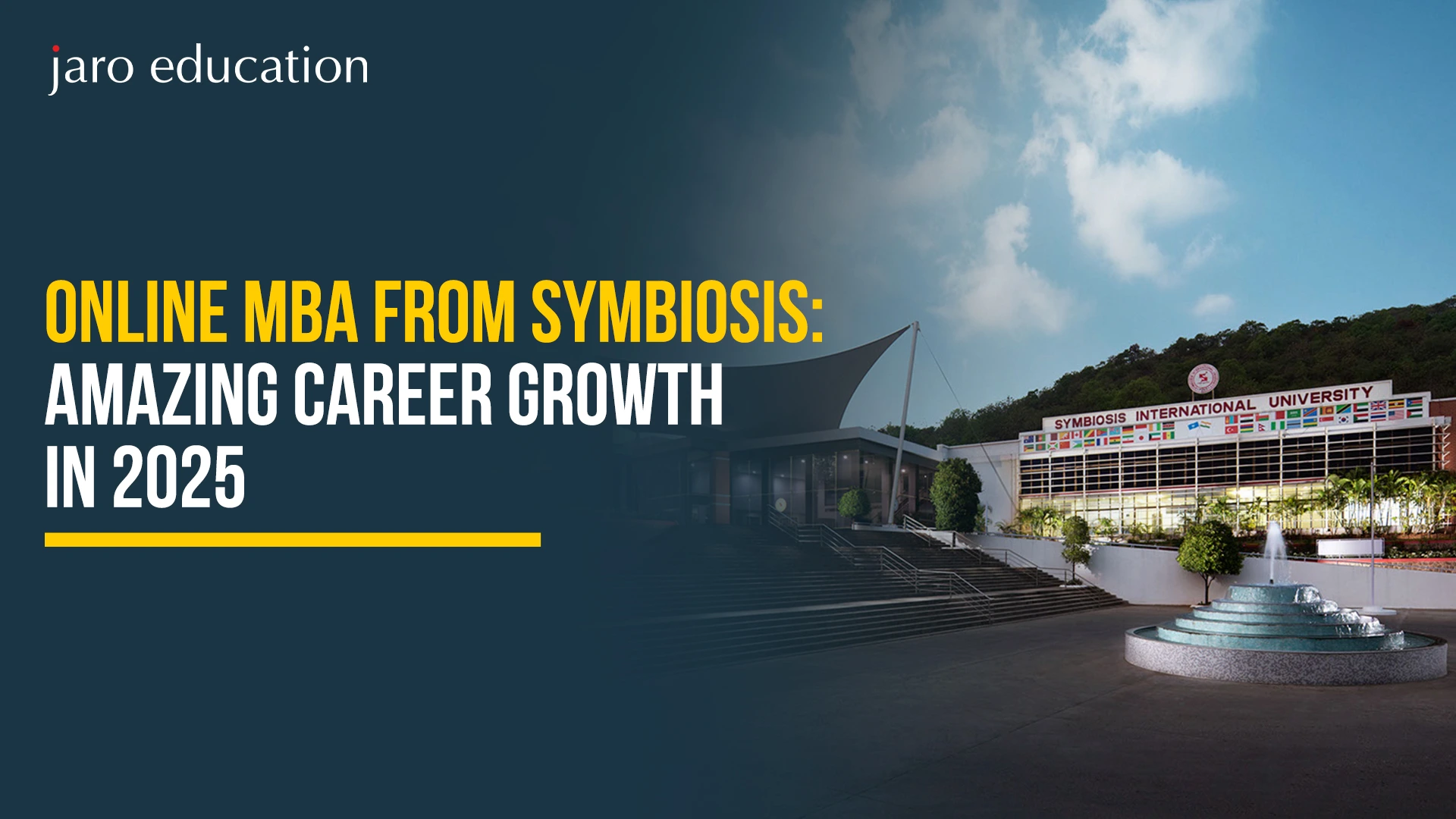Compelling Reasons Why an MBA After a B.Sc. is the Best Choice in 2025
Table of Contents

- jaro education
- 31, October 2024
- 5:00 pm
If you’ve often found yourself wondering, “What comes next after my B.Sc degree?”, don’t worry, for you’re not alone! In today’s competitive job market, enhancing your qualifications is more crucial than ever. For graduates holding a Bachelor of Science (B.Sc) degree, one of the most effective ways to leverage technical knowledge and propel your career forward is by pursuing a Master of Business Administration (MBA) after your B.Sc degree. This guide will explore the importance of obtaining an MBA after your B.Sc degree, the benefits of online education, and the various opportunities that await you.
The Value of an MBA After a B.Sc Degree
The Master of Business Administration (MBA) is a globally recognized degree that signifies proficiency in management principles and practices. Pursuing an MBA after your B.Sc degree is a strategic move that opens numerous career avenues. Here are some compelling reasons to consider this educational path:
Enhanced Career Prospects
By pursuing an MBA after your B.Sc degree, you can significantly boost your employability and career advancement potential. Companies today seek individuals who possess not only technical skills but also strong management capabilities. An MBA equips you with the skills necessary for leadership roles, making you an attractive candidate for employers.
Diversification of Skills
Pursuing an MBA after your B.Sc degree allows you to diversify your skill set. While a B.Sc provides you with specialized knowledge in your field, an MBA enhances your understanding of business operations, marketing, finance, and human resource management. This blend of skills prepares you to take on versatile roles in the corporate world.
Real-World Applications
The skills acquired during an MBA program have real-world applications across various sectors. Whether you’re interested in finance, healthcare, or technology, the knowledge gained from an MBA after your B.Sc degree will enable you to contribute effectively to your organization.
Building a Professional Network
One of the key advantages of pursuing an MBA after your B.Sc degree is the opportunity to expand your professional network. During your MBA studies, you will meet fellow students, faculty, and industry professionals, all of whom can play a pivotal role in your career development. Building a robust professional network can lead to mentorship opportunities, internships, and jobs after B.Sc, significantly enhancing your career prospects.
Online MBA: A Flexible Option for B.Sc Graduates
In today’s fast-paced world, flexibility in education is crucial. An online MBA program and a B.Sc go hand in hand, providing graduates the opportunity to enhance their qualifications without disrupting their careers. Here are some key benefits of pursuing an online MBA after your B.Sc degree:
Convenience and Flexibility
- Study from Anywhere: You can study from the comfort of your home or any location of your choice.
- Self-Paced Learning: Most online programs allow you to learn at your own pace, making it easier to balance work and studies.
Access to Quality Education
Many online MBA programs, such as the Online MBA Degree Programme at Symbiosis School for Online and Digital Learning (SSODL), offer high-quality education that is on par with traditional programs. You can benefit from recorded lectures, interactive sessions, and access to top-notch faculty without the need to relocate.
Cost-Effective
Pursuing an MBA after your B.Sc degree through an online program can also be more cost-effective than traditional full-time courses after your B.Sc. degree. You can save on commuting, accommodation, and other associated costs while still receiving a quality education. Moreover, many institutions offer scholarships and financial aid to help alleviate the financial burden.
Career Advancement While You Learn
Another significant advantage of pursuing an online MBA after your B.Sc degree is the ability to continue working while studying. This dual approach allows you to apply what you learn in real-time, making your educational experience more relevant and impactful. It also means you can avoid potential financial strain by maintaining your income during your studies.
Specializations to Consider
One of the appealing aspects of an MBA after your B.Sc degree is the wide array of specializations available. Here are some popular specializations that B.Sc graduates might consider:
| Specialization | Description |
|---|---|
| MBA in Healthcare Management | Focuses on managing healthcare facilities and understanding healthcare policies. |
| MBA in Information Technology | Combines technical knowledge with management skills for roles in tech companies. |
| MBA in Finance | Prepares for careers in investment banking and financial analysis. |
| MBA in Marketing | Covers consumer behavior, advertising strategies, and market analysis. |
| MBA in Operations Management | Enhances skills in optimizing business processes and supply chain management. |

*Edukyu
The Role of Jaro Education
When considering your options for pursuing an MBA after your B.Sc degree, Jaro Education stands out as a reputable provider of online education. The Online MBA Degree Programme at Symbiosis School for Online and Digital Learning (SSODL) is specifically designed to cater to the needs of working professionals. Here’s what Jaro Education brings to the table:
Comprehensive Curriculum
- Real-World Focus: The curriculum is designed to bridge the gap between theory and practice, providing you with skills applicable to real business scenarios.
- Diverse Subjects: Covers a range of topics including finance, marketing, operations, and strategic management.
Networking Opportunities
Through Jaro Education, you gain access to a vast alumni network of professionals from various industries. This network can provide valuable insights, mentorship, and job opportunities as you navigate your career after completing your MBA.
Expert Faculty
Jaro Education collaborates with industry experts and experienced faculty members who bring real-world knowledge into the classroom. Learning from these professionals will enrich your educational experience and provide you with insights that are directly applicable to your career.
Career Support Services
Jaro Education offers robust career support services, including:
- Resume Building: Assistance in crafting effective resumes tailored to your desired roles.
- Interview Preparation: Mock interviews and coaching to boost your confidence.
- Job Placement Assistance: Help in connecting with potential employers and jobs after B.Sc.
Financial Considerations for Pursuing an MBA
Investing in an MBA after your B.Sc degree is a significant financial commitment, and it’s essential to consider your options carefully. Here are some financial aspects to keep in mind:
Tuition Fees
Research the tuition fees for various MBA programs and compare them to understand which options fit within your budget.
| Program | Estimated Tuition Fees (INR) |
|---|---|
| SSODL Online MBA | 3,00,000 |
| Other Online Programs | 30,000 - 10,00,000 |
Scholarships and Financial Aid
Explore scholarship opportunities and financial aid options available through institutions like SSODL. Many universities offer scholarships based on merit or need, which can significantly reduce your overall educational expenses.
Expected Salary IncreaseExpected Salary Increase
An MBA can lead to substantial salary increases post-graduation. Research the average salaries for graduates in your desired field to understand the potential return on your investment. B.Sc graduates who pursue an MBA often see a considerable boost in their earning potential.
| Career Field | Average Salary (Before MBA) | Average Salary (After MBA) |
|---|---|---|
| Finance | 6,00,000 | 10,00,000 |
| Healthcare Management | 5,50,000 | 9,00,000 |
| Marketing | 5,00,000 | 8,00,000 |
| Operations | 5,50,000 | 8,50,000 |

*mbasocial
Conclusion
In conclusion, pursuing an MBA after your B.Sc degree can significantly elevate your career trajectory, opening doors to numerous opportunities across various sectors. The Online MBA from Symbiosis School for Online and Digital Learning is designed to cater to the needs of B.Sc graduates, providing a flexible and high-quality educational experience.
With a robust curriculum, the Jaro Advantage, and the ability to learn while you work, this program can equip you with the skills necessary to thrive in today’s competitive job market.
If you are ready to embark on this exciting journey and turn your aspirations into reality, connect with us today to learn more about the Online MBA program and how it can benefit your career. Your future awaits, and pursuing an MBA after your B.Sc degree could be the stepping stone to your success in the corporate world in 2025 and beyond!
Frequently Asked Questions
Choosing the best course after a B.Sc degree largely depends on your career goals and interests. However, some popular options include:
-
- MBA (Master of Business Administration): Ideal for those interested in managerial roles, business development, or entrepreneurship. It provides essential management skills applicable across various industries.
- M.Sc (Master of Science): A good choice for those who wish to delve deeper into their specific field of science, such as Physics, Chemistry, Biology, or Mathematics. An M.Sc is often essential for research-oriented careers.
- MCA (Master of Computer Applications): Suitable for B.Sc graduates with a background in Computer Science or Information Technology, this program focuses on software development and IT management.
- PGDM (Post Graduate Diploma in Management): Similar to an MBA, this program often emphasizes practical management skills and industry connections.
- Certification Courses: Short-term courses after your B.Sc. degree can be pursued in data science, digital marketing, or other specialized fields to enhance employability.
After completing a B.Sc degree, several job opportunities are available depending on your specialization. Here are some common roles:
-
- Research Assistant: Working in laboratories or research facilities to assist with experiments and data collection.
- Laboratory Technician: Conducting tests and analyses in medical, chemical, or research laboratories.
- Quality Control Analyst: Ensuring products meet quality standards in manufacturing or pharmaceuticals.
- Data Analyst: Analyzing data sets to provide insights for businesses, especially for those with a strong quantitative background.
- Teaching: If you’re interested in education, you can consider teaching at schools or coaching centers.
- Internships: Gaining experience through internships can also be a stepping stone to full-time roles in various sectors.
Yes, you can pursue an MBA after a B.Sc degree. Many B.Sc graduates opt for an MBA to enhance their management skills and broaden their career prospects. An MBA program values diverse academic backgrounds, and your B.Sc knowledge can be a significant asset, especially in industries like healthcare, technology, or finance. Admission requirements typically include a bachelor’s degree, entrance exam scores (like CAT, MAT, or GMAT), and sometimes relevant work experience.
The choice between pursuing an MBA or an M.Sc after a B.Sc degree depends on your career aspirations:
MBA:
-
-
- Best for those aiming for leadership, management, or entrepreneurial roles.
- Focuses on business administration, management principles, and practical applications.
- Suitable for diverse fields, making it versatile.
-
M.Sc:
-
-
- Best for individuals interested in deepening their scientific knowledge and pursuing research-oriented careers.
- Focuses on advanced theoretical concepts and research methodologies in a specific discipline.
- Ideal for those wanting to work in academia, research, or specialized scientific roles.
-
Ultimately, the decision should align with your long-term career goals and interests. If you aim for management roles, an MBA may be the better option. If you wish to pursue a scientific career or research, an M.Sc would be more suitable.








